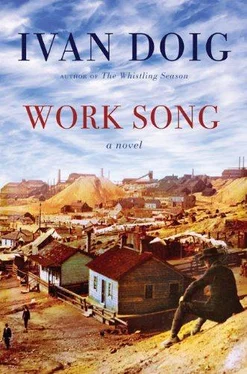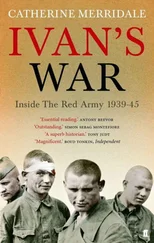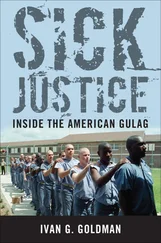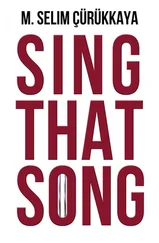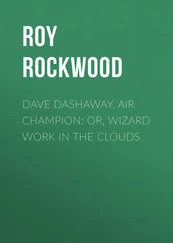The parlor was empty, as was the dining room; no caller, no Grace, anywhere.
Just as panic was setting in on me, she called from the kitchen: “In here, Morrie. Your visitor is making me tired just looking at him.”
At the first glimpse of my guest, I relaxed the grip on my weaponry. Dealing with a twelve-year-old may take a lot of one’s resources, but usually not brass knuckles.
Skinny as the sticks of kindling in the woodbox behind him, in dusty patched pants and a hand-me-down shirt, Russian Famine was only barely occupying a chair, one leg jittering and then the other, ready to bolt. Grace, as usual in crisp apron and a dress so clean it practically squeaked, was looking at him as if one or the other of them was at the wrong costume party. So as not to confound her even further, I retrieved the boy’s given name with a smile: “Wladislaw, we meet again. What brings you?”
Even his words were thin and fidgety. “Miss Rellis needs to see you. At that Poority place.”
“It’s another long story,” I fended off Grace’s quizzical look. Gesturing toward our surprise caller, I made a supping motion. “Perhaps…?”
“Good heavens, yes.” She cut a thick slice of bread, put it on a plate, and set it in front of the famished-looking youngster. Pouring from the syrup can, she said, “Say when.”
“I like it sogged.”
The syrup pooled on the plate before the boy nodded. As he tucked in to the food, Grace wordlessly cut another slab of bread for him. I excused myself to fetch my hat from upstairs. When I came back down, Grace’s guest reluctantly licked his fork and edged out of the chair to go with me. “I may be a while,” I told her. “Skip me at supper.”
“The larder can stand a chance to recover,” she bade us off, still looking mystified.
Another side of Butte showed itself in the route I was now led on. With a nonchalance you might not expect in a sixth-grader, my guide took an immediate shortcut through Venus Alley. Overhead in one of the red-curtained windows, the sash was flung up and a woman in a kimono leaned out. “Hey, kid! How about running over to Betty the bootlegger’s and getting us a bottle of her best?”
“I’m busy, can’t you see?” the boy called back importantly.
“Then how about you, Mustachio? Come on up and we’ll cure what ails you.”
“I’m busy keeping up with him,” I tipped my hat, “thank you very much anyway.”
Block after block, we wound our way past buildings that put all their respectability out front, their back ends grimy with the detritus of coal chutes and the leavings of garbage. Around every other corner a view of the Hill was framed between brick walls, the tower over a mineshaft like a spiked ornament on the roof of the city. I could hear the throb of ore lifts and other machinery, so pronounced after the silence left behind when the morning shift walked off; Jared and his tactic of work actions was turning the Hill off and on like a master switch. If, that is, the Anaconda Company didn’t find a way to break his hold on the matter. Or already had. I wondered again why Rab was summoning me.
Suddenly my hotfooted escort was talkative. “How come you work at the library ’stead of the schoolhouse? I was just telling Miss Rellis she’s the best teacher in the whole world and she said not as long as you’re on two legs.”
That touched me deeply. Yet it also mandated an answer. “Life likes to surprise us, Wladislaw, and so-”
“I hate getting called that,” he muttered, squirming as if to dodge the name. “It sounds too much like coleslaw.”
“Russian Famine, then-”
“Don’t like that no better. I ain’t any kind of a Russian. My unk says if we’re anything, it’s Glishians.” I tried to remember if Galicia was central to what the Europeans from time immemorial called the Polish Problem, and whether that part of Poland was another jigsaw piece on the table in front of Wilson and Clemenceau and Lloyd George as they sought to remake the world with the peace treaty. In any case, the Old Country was forever off the map of a peddler whose only ware was the sharpening of knives, and a skin-and-bones street tough nephew, wasn’t it. The thought clutched at me: the fostering places that we are exiled from, in the irreversible twists of life.
Back to the question at hand, though. “Young citizen of the world, we are running out of possibilities-what would you like to be called?”
He thought for the next some steps, slowing his pace to mine. “Famine ain’t too bad. It’d be one of those nicked names, huh?”
Gravely I took off my hat and in due ceremony tapped him on a narrow shoulder with it. “By whatever authority is vested in me, I dub thee Famine.” He bounced a little higher his next couple of steps. “Now, then, Famine, as I was saying. Sometimes a person finds himself doing the unexpected. And so you give each job everything you have, but stay on your toes for what comes next. Isn’t it that way with you at school?”
A shrug. “I guess. Miss Rellis’s flame says it’s the same in the army-now you’re peeling spuds and next thing you’re shooting back at somebody.”
“Jared is at the Purity with her?”
“Uh-huh.” The boy flopped his hair out of his eyes and looked around at me hopefully. “That sure was good about blood. Are you gonna do story hour some more?”
“We’ll see,” I said, smiling. “That’s up to the man who runs the library.”
“With all the whiskers? The one they call the Earl of Hell?”
That stopped me in my tracks.
“Where did you hear that?”
Famine slowed himself to wait for me by walking backwards. “Down around the stockyards. Those cowboys riding the fence are always yakking about something.”
I felt relieved. I could easily believe Samuel Sandison had been high-handed in his ranch days and gained that name in the Triple S bunkhouse. That had me thinking about the doggedness of reputation, fair or not, when Famine, curiosity on as much of his face as there was, wanted to know:
“What’s a earl?”
“Someone who owns everything but a good name, usually. That other word, I’d advise you not to use around Miss Rellis.”
“Uh-huh, she’s death on cussing.” Restless as a hummingbird, Famine now was talking to the top of my head. I had frowned him off clambering on fire escapes along our backstreet route, but he couldn’t resist hopping up onto the loading docks at rear entries to stores. He teetered along the planked edge of this latest one, his sense of balance making a mockery of gravity. I watched with the envy of those of us who have outgrown the blind bravery of a twelve-year-old. Perhaps it was the pale sharp cheeks or the flatly factual eyes beneath the toss of uncombed yellow hair, but he looked oddly pristine up there, more like a trainee in an acrobats’ academy than a schoolboy. I thought back to the blood enthusiasts among his classmates, and to the black eyes, bent noses, scabs, and bruises that my Marias Coulee pupils accumulated in the average mayhem of the schoolyard. Skinny and milk-skinned as he was, my young friend seemingly would be a bullies’ delight, yet there was not a mark on him. “Famine, I’m not trying to be nosy, but the bigger boys don’t give you trouble?”
“Would if they could catch me.”
“You’re quite the runner, then. Don’t they ever catch you?”
“Huh-uh.” He continued along the outmost inch of the loading platform with the aplomb of a tightrope walker. “I run until they drop.”
AFTER DEPOSITING ME at the entrance to the Purity Cafeteria, Famine vanished at a high lope. The owner, a scarlet bow tie blazing under his set of chins, met me with a glad cry. “I knew you’d be back,” the gust of welcome nearly parted my hair. “Your appetite wouldn’t let you stay away! Help yourself, this is the spot to fill that hollow leg!” I slipped in line behind a broad-beamed couple who obviously had partaken of the menu many times before. First things first, as ever; I peeked from behind the glassware breakfront to make sure the Typhoon goon was not on the premises, then gathered a meal for myself and joined Rab and Jared at their corner table.
Читать дальше
